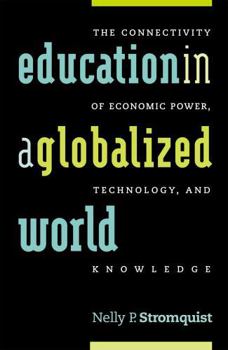Education in a Globalized World: The Connectivity of Economic Power, Technology, and Knowledge
The seemingly amorphous phenomenon we call 'globalization' involves concrete realities that make it a major source of social change in our contemporary world. Bringing globalization alive for students, this book uses examples and perspectives from economics, technology, and mass media to show how globalization is producing unprecedented impacts on education and culture. Education at all levels-from primary school to university education-is undergoing a world wide transformation of its objectives, values, and practices. New technologies and communication practices have promoted the West's optimism that market forces can replace the former governmental responsibilities for social welfare and the inclusion of diverse cultures. New emphasis on competition, quality control, parental choice, marketing, and the linkage of education to work means that schools all over the world face innovations and challenges to established practices. Meanwhile, the worldwide expansion of entertainment and advertising media convey notions of individualism and consumerism that are changing definitions of gender and solidarity among social groups. This book offers a vivid introduction to these complex changes, recognizing the role of the state while explaining new forces like transnational corporations and nongovernmental organizations. Stromquist points to governmental and school policies that can actively shape the future of education at a time of rapid change.
Format:Paperback
Language:English
ISBN:0742510980
ISBN13:9780742510982
Release Date:August 2002
Publisher:Rowman & Littlefield Publishers
Length:248 Pages
Weight:0.87 lbs.
Dimensions:0.5" x 6.4" x 9.0"
Customer Reviews
2 customer ratings | 2 reviews
There are currently no reviews. Be the first to review this work.





















